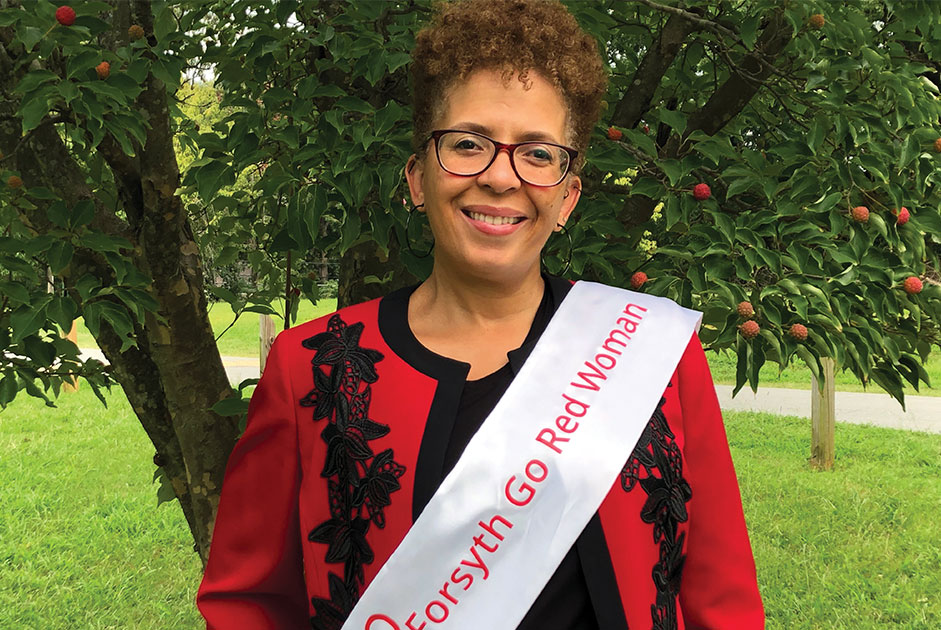BY BRIA LEWIS/AMERICAN HEART ASSOCIATION
In March of 2011, doctors told Cécile Boynton of Winston-Salem that she wouldn’t be able to walk without assistance. In September of 2020, she ran 50 meters in 10.31 seconds – taking bronze in the National Senior Games.
Something Didn’t Feel Right
Prior to her doctors’ dire predictions in 2011, Cécile had been driving home from a long day of work and looking forward to her workout with her husband, Mark. They had met at a Tae Kwon Do school and five months into their marriage, training together was still part of their newlywed bliss.
Suddenly, Cécile started to feel badly, so she pulled off the road. “It’s hard to describe, but I just didn’t feel right,” remembers Cécile. However, she thought she’d be able to make it home. “I pulled back onto Highway 52 South to continue driving, and the next thing I remembered was people standing outside of my car shouting at me.”
Her car was upside down and far off the highway. “I vaguely remember the paramedics asking if I was okay, but I couldn’t answer questions like my name, preferred hospital, or what family member they should call. My vision was blurry, and the right side of my body, my arm, and my leg didn’t work,” recalls Cécile.
Unable to speak, losing strength and paralysis settling in on her right side, she was filled with fear. “I didn’t know what was happening, but when I finally saw Mark’s face, I knew everything would be better because he was there. He took one look at me – right side unresponsive, face drooping, speechless – and immediately realized I was having a stroke,” said Cécile.
The decision was made to perform a mechanical thrombectomy, entering through the femoral artery in her leg and passing through her body, heart, and into her brain to grab, retrieve, and remove the clot. Unfortunately, the clot broke apart during the procedure and Cécile continued to have strokes the next day. The one thing that gave her reassurance that everything would be okay was Mark. “All he kept telling me was that he loved me, and I had only one job: GET BETTER,” Cécile explained.
Recovery Was a Team Effort
“When we got settled in ICU, Mark started working my right side, literally from head to toe, trying to teach my body and brain how to compensate, working endlessly every day. He’d even try to get me to sing old nursery rhymes or the alphabet, anything that could trigger my speech,” Cécile stated. “We were a team and there was no way we were going to lose!”
After 42 days, Cécile was able to come home; Mark did everything in his power to make sure his bride had everything she needed. In addition to her therapy sessions, he designed daily plans tailored just for Cécile. “I had to relearn basic arithmetic and colors. I spent countless hours trying to name a car for every letter of the alphabet, working with pegboards, and balancing on one foot. Mark even took my third-degree black belt from Tae Kwon Do and tied my left arm to my body, forcing me to use my right hand! Together, we were beating the stroke and the odds,” exclaimed Cécile.
Stroke Doesn’t Mean the End of Your Life
The stroke was lightning out of a blue sky for Cécile. In her early forties, she was in great shape since she had trained in Tae Kwon Do for almost 11 years, and she didn’t have high blood pressure or diabetes issues. It was finally determined that her stroke was caused by a spontaneous clot that formed in her carotid artery. Doctors confirmed a diagnosis of Hughes Syndrome, which has an increased risk of blood clots.
Continuous physical therapy, facing down depression, and focusing on cognitive rehabilitation allowed Cécile to return to working full-time. She has not jumped back into Tae Kwon Do due to her loss of vision in one eye and the need to be on blood thinners. However, Mark and Cécile are still working out together at their local YMCA. “Stroke doesn’t have to mean the end of your life. Don’t take ‘no’ for an answer!” shares Cécile.
“Stroke has impacted our lives greatly. What many couples learn through decades of life together, Mark and I learned in a few years, making our bond unbreakable. We can overcome anything if we do it together! I am incredibly thankful for research, every doctor and therapist that helped save my life, and Mark, my biggest coach, cheerleader, and the love of my life,” Cécile stated.
Cécile Boynton is a 2020 Forsyth County Go Red Woman. She is sharing her story to help prevent stroke. Novant Health is proud to be the American Heart Association’s “Life is Why” and “Go Red for Women” sponsor in Forsyth County, celebrating, supporting, and encouraging women to put their health first wherever they may be in their journey.


















